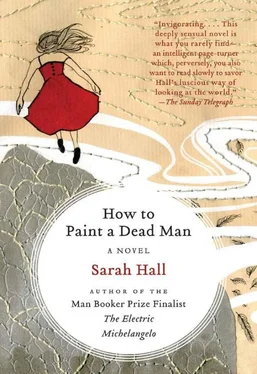Sarah Hall - How to Paint a Dead Man
Здесь есть возможность читать онлайн «Sarah Hall - How to Paint a Dead Man» весь текст электронной книги совершенно бесплатно (целиком полную версию без сокращений). В некоторых случаях можно слушать аудио, скачать через торрент в формате fb2 и присутствует краткое содержание. Год выпуска: 2009, Издательство: Harper Perennial, Жанр: Современная проза, на английском языке. Описание произведения, (предисловие) а так же отзывы посетителей доступны на портале библиотеки ЛибКат.
- Название:How to Paint a Dead Man
- Автор:
- Издательство:Harper Perennial
- Жанр:
- Год:2009
- ISBN:нет данных
- Рейтинг книги:4 / 5. Голосов: 1
-
Избранное:Добавить в избранное
- Отзывы:
-
Ваша оценка:
- 80
- 1
- 2
- 3
- 4
- 5
How to Paint a Dead Man: краткое содержание, описание и аннотация
Предлагаем к чтению аннотацию, описание, краткое содержание или предисловие (зависит от того, что написал сам автор книги «How to Paint a Dead Man»). Если вы не нашли необходимую информацию о книге — напишите в комментариях, мы постараемся отыскать её.
, Sarah Hall, "one of the most significant and exciting of Britain's young novelists" (
), delivers "a maddeningly enticing read... an amazing feat of literary engineering" (
).
How to Paint a Dead Man — читать онлайн бесплатно полную книгу (весь текст) целиком
Ниже представлен текст книги, разбитый по страницам. Система сохранения места последней прочитанной страницы, позволяет с удобством читать онлайн бесплатно книгу «How to Paint a Dead Man», без необходимости каждый раз заново искать на чём Вы остановились. Поставьте закладку, и сможете в любой момент перейти на страницу, на которой закончили чтение.
Интервал:
Закладка:
He does not speak ill of his wife. There are no complaints, no unkind sentiments. At your neck, against your thigh, he speaks only of wanting you. He makes breathless erotic pleas. Can I take this off? Please. Tell me what to do. Tell me to stay still . Only once, when you were dressing yourself afterwards, preparing to leave the hotel, and you could not find your other shoe under the bed covers, he said, She is not you. You understand it, don’t you? You know what it does to you? You know nothing of his love for Angela and their daughter, or his habits at home. You have not yet read anything he has written. But you know the events of his childhood, what he has seen. You know the haunted space he is looking into when he moves against you. You know that he comes using his full body, his ecstasy straining to get out, the seizure seeming to break apart his every atom.
Angela puts her hand on your shoulder. Really, you don’t look well. I’m going out to get you something to pick you up a bit, OK. Maybe some peppermint tea? She shrugs on her cardigan, collects her purse. The place looks great, Suze. Really great. You’ve worked so hard. I know it’s been difficult. On her way to the door she pauses. Hey, you don’t think you’re pregnant do you? I felt like shit when I was pregnant with Anna. I wanted to collapse all the time. You smile, and shake your head, but something inside you splits, and you feel half of you subside along a fault line running from the base of your skull down your backbone. Angela shuts the front door and is gone. The building ticks, listening. For a moment you sit still, waiting for something. Something. Then you go to the cloakroom and look in your bag for your organiser. You can only see your phone and your wallet.
When you open the door the snug is almost in darkness, but for the glow of the screen, and a weak table lamp. The curtains are drawn. Tom is wearing headphones. He cannot hear the traffic on the main road, the birds in the trees next to the heath, or the hustle of the city beyond. He doesn’t hear you come in, and it is like that first time, when you found each other and it all began. Behind him, the erogenous red paper left on the walls three years ago, as if you had both dressed the stage for the exchanges that would follow. His back is turned. You walk towards him, a shadow in the room. On the desk next to the computer is a pad of paper on which he has written columns of words. His diary is open to this week’s page. You stand behind him, calculating.
In a moment you know he will turn round. He will glance past you to the door, which is open. Then he will look at you and his eyes will flicker with excitement. You will take his fingers into your mouth and put his hands under your skirt. You’ll feel him stroke your legs, and move you on to his lap. He will pull your buttocks apart as if separating pieces of a fruit. He will rub you wet with his thumb, open the fastening, and move the tip of himself into place. You will hurt yourself slowly, your legs either side of the chair, and he will continue to open you outwards as you move.
In a moment he will turn round and his eyes will flicker.
The Divine Vision of Annette Tambroni
The following week brings high temperatures again. The earth cracks open. Taps wheeze and trickle. It is the season of floating pollen, sticky arms and abandoned arguments. It is the season of wilting peonies and calendulas. Beekeepers have brought their produce to the market, jars bright and slow with their gorgeous orange contents, and then returned to their fields with swollen wallets. The professional cyclists have passed through the town, pushing stiffly up into the hills through the cheering crowds, gathering speed around the chicanes of the downhill slopes, and flashing away down colonnades of aspen and barley. Young birds have become confident about leaving their nests. The pavements ripple with heat.
A week after the purchase of the television, Annette is no clearer about its governances and possibilities, but the rest of the family are fully committed to its charms. Uncle Marcello believes absolutely that he could win Lascia o Raddoppia. He has dispatched a letter of application to the competition. He will write one a week for the rest of the year until they accept, he insists. If he wins, the business will be sold to another family and they can all retire to Argentina. Her mother is uncertain about this proposal. Argentina is the Land of Forgetting, in case he has forgotten, and there they could lose their heritage and their patriotism. It will be too hot in summer, too cold in winter. And besides, Vincenzo will not want them; he writes so infrequently it is as if all thoughts of reunion with his family have vanished. ‘Then a world cruise,’ Uncle Marcello says optimistically, ‘if it pleases you more, Rosaria.’ There has been a miracle reported on the news.’ Near Naples, a girl has levitated. Witnesses say she was surrounded by heavenly rays and cleared three feet at least. The Vatican is investigating. Maurizio complains that his favourite advertisement for nylon stockings has been discontinued. If the skirt was too short and broke the decency codes, then why was it made in the first place? he asks. He shakes his hand when Mina Mazzini steps past the piano to the microphone, and Annette can hear his fingers slapping against each other like fresh-caught fish in a bucket. Their mother re-tunes the channel.
Tommaso is less enthusiastic about the buzzing, twittering box of pictures. He is engaged in riding up and down the hills, between ruined towers and ripe vineyards, and even up the steps of the cimitero di campagna. ‘I have to build up my thighs,’ he says, when Father Mencaroni asks him why he is leaving tyre tread on the sacred masonry. Sacrifices have to be made if he is to produce a gold medal for the country, he informs the priest, and off he rides, leaving a small cloud of dust to settle on the priest’s cassock. Father Mencaroni shakes his head.
Either the mignonette honey, or the television’s distraction, has saved Annette’s mother from her weekly migraine. She is busy watching the religious programmes, instead of lying down in her room with a camomile head-wrap. When Annette leaves for the church, her mother does not say anything about her returning home safely, or minding the potholes in the road and the troglodyte Southerners. Nor does she insist that Mauri and Tommaso accompany her to mass, for mass has been brought to her. She watches in a headscarf, her long dress arranged in drapes over her knees, and her hands linked, exactly as if she were sitting at a pew in San Lorenzo.
Annette gathers up some peonies for her papa and for Signor Giorgio. She counts the number of flowers on each. They are uneven. It cannot be helped; sometimes nature makes unlucky patterns. Their globes are full and heavy. The petals froth and their scent is balanced delicately between mountain air and frankincense. Concentrating hard, perhaps she can just see a border of red, an echo of red near her hand when she holds up the stems. Sometimes red can be seen in the world because it is so vivid. But sometimes the colour is simply a trick of blood lighting the discreet hollows of her eye sockets. She is nervous after the incident with the shadow last week. Though she has bled, she does not feel as if what went into her has been brought back out. She does not feel cleansed. She finds Tommaso pumping up his bicycle tyres and asks if he will come with her to the church. ‘Why?’ he demands. He has already been excused and he does not wish to be recommissioned. ‘I just like your company, little one,’ Annette tells him. Maybe he will come later after his training, he says.
She collects the little rosemary spirit-stopper from her dresser and steps outside into streets as warm as an oven. On the way to San Lorenzo, people amble by and greet her pleasantly. ‘Hello. Good day. Not with your brothers this week? Regards to Signora Tambroni and to your uncle. Stay in the shade!’
Читать дальшеИнтервал:
Закладка:
Похожие книги на «How to Paint a Dead Man»
Представляем Вашему вниманию похожие книги на «How to Paint a Dead Man» списком для выбора. Мы отобрали схожую по названию и смыслу литературу в надежде предоставить читателям больше вариантов отыскать новые, интересные, ещё непрочитанные произведения.
Обсуждение, отзывы о книге «How to Paint a Dead Man» и просто собственные мнения читателей. Оставьте ваши комментарии, напишите, что Вы думаете о произведении, его смысле или главных героях. Укажите что конкретно понравилось, а что нет, и почему Вы так считаете.












